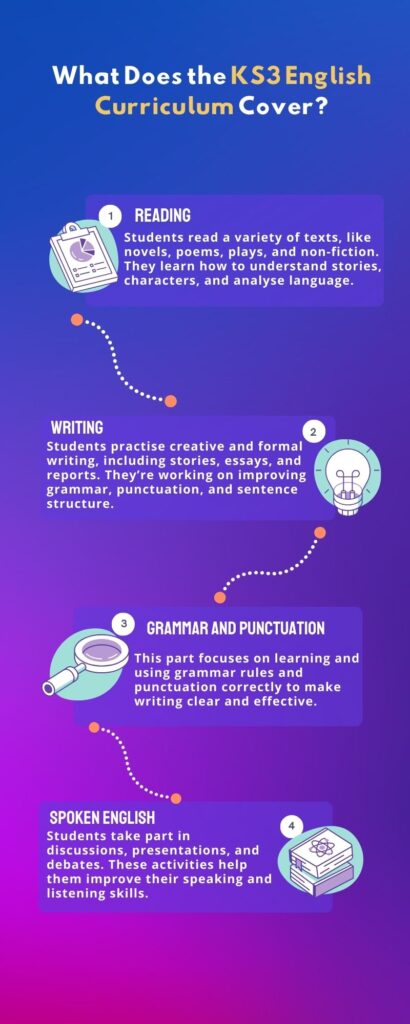KS3 English is an important part of the UK curriculum. It helps students build the skills they need for future studies. During Years 7 to 9, students focus on reading, writing, grammar, and speaking. These lessons improve communication, boost creativity, and develop critical thinking.
In this blog, you’ll find everything you need to know about Key Stage 3 English. Whether you’re a student who wants to do better, a parent helping your child, or a teacher looking for ideas, this guide is here to help. We’ll cover the curriculum, study tips, and useful resources to make learning easier and more enjoyable.
- What Does the KS3 English Curriculum Cover?
- KS3 English Assessments
- KS3 English: Supporting Your Child’s Reading
- Developing Writing Skills at KS3 English
- Helping Your Child Improve Grammar and Punctuation in KS3 English
- Encouraging Spoken English In KS3
- KS3 English : Tracking Progress and Providing Feedback
- KS3 English: Recommended Resources for Parents
- Conclusion
What Does the KS3 English Curriculum Cover?
Key Stage 3 English focuses on building essential skills that prepare students for success in GCSEs and beyond. As your child develops their reading, writing, grammar, and speaking abilities, they lay the groundwork for GCSE English. Let’s take a closer look at the main components of the curriculum.

What Skills Will Your Child Develop?
Key stages are important phases in a child’s education, helping them build skills progressively. Before reaching Key Stage 3, children go through Key Stage 1 and Key Stage 2, where they develop many abilities. These earlier stages prepare them for more advanced topics introduced in Key Stage 3, ensuring a smooth transition to secondary school. During Key Stage 3, your child will develop essential skills across all core subjects, including English and KS3 maths. In English specifically, they will:
Learn to Analyse Texts: They’ll practise finding deeper meanings in stories, poems, and other texts.
Improve Creative Writing: Writing activities will help them use their imagination and creativity.
Strengthen Communication: They’ll work on expressing their ideas clearly, both in writing and speech.
By understanding the KS3 English curriculum, you can better support your child’s progress. This stage sets the foundation for success in future studies and builds key life skills.
KS3 English Assessments
Assessments in Key Stage 3 English are essential for tracking your child’s progress and preparing them for future academic challenges. As mentioned earlier, these assessments focus on four key areas: reading, writing, spoken English, and grammar and punctuation. You might wonder, why are they so important? By understanding how these assessments work and helping your child prepare, you can build their confidence and set them up for success in Key Stage 3 English.
While English is a core part of KS3, it’s also helpful to know which subjects are compulsory at GCSE. This knowledge can guide your child’s academic focus as they transition to the next stage of their education.

Purpose of Assessments
Assessments help teachers understand your child’s strengths and areas that need improvement. They also prepare students for the formal structure of GCSE exams, giving them experience with written and oral evaluations.
How You Can Support Your Child?
Encourage Regular Practice: Help your child prepare for assessments by practising writing essays, analysing texts, or rehearsing presentations. One effective way to reinforce their learning is through KS3 English worksheets. These worksheets provide targeted exercises in grammar, punctuation, reading comprehension, and writing, allowing your child to focus on key areas.
Use Past Papers: Reviewing example questions or past assessments can familiarise your child with the format and expectations.
Communicate with Teachers: Stay informed about upcoming assessments and ask for feedback to identify areas where your child can improve.
Build Confidence: Praise their efforts and remind them that assessments are a chance to learn and grow, not just a test of ability.
KS3 English: Supporting Your Child’s Reading
One of the most effective ways to support your child’s English skills at Key Stage 3 is by encouraging regular reading. Here are some simple ways you can help:
- Provide a Variety of Books
Introduce your child to a range of reading materials, including novels, poetry, plays, and non-fiction. Offering a mix of genres and topics can keep them interested and help them develop a broader understanding of language. - Build a Consistent Reading Routine
Set aside a specific time each day or week for reading. A regular schedule-such as reading before bed or during a quiet afternoon-helps make reading a habit. - Discuss What They’re Reading
Talk about the books they’re exploring. Ask open-ended questions like, “What did you think of the main character?” or “Why do you think the author chose that ending?” These conversations help your child think critically and engage more deeply with the material. - Encourage Active Reading
Show them how to take notes, highlight key points, or jot down questions as they read. This habit can improve comprehension and retention, making them more confident when analysing texts. - Use Audiobooks and E-books
If your child isn’t a fan of traditional reading, consider audiobooks or e-books. These formats can make reading more accessible and enjoyable, especially for reluctant readers.
By creating a supportive reading environment, you’re helping your child strengthen their comprehension skills, expand their vocabulary, and develop a lifelong love for reading-all of which are crucial for success in KS3 English.
Developing Writing Skills at KS3 English
Developing strong writing skills is an important part of KS3 English. Parents can play a vital role in encouraging their child’s writing progress.
Encourage your child to explore creative writing by crafting short stories or personal journals, as this not only fosters imagination but also makes writing enjoyable. Structured writing exercises, such as composing essays and reports, can help them learn to organize their thoughts clearly. Alongside this, reviewing grammar and punctuation together will polish their writing and improve clarity.
When providing feedback, always highlight their strengths before suggesting improvements-this approach builds confidence and motivation. You can also introduce practical prompts based on real-life topics that interest them, making writing more relevant and engaging. By supporting your child’s writing at home, you’ll help them grow into a skilled and confident writer.
Helping Your Child Improve Grammar and Punctuation in KS3 English
As a parent, you play a key role in supporting your child’s progress in Key Stage 3 English. By focusing on grammar and punctuation, you can help them develop stronger writing skills and gain confidence in their schoolwork.

Finding Teachable Moments
Everyday activities provide great opportunities to talk about grammar. For example, when reading a news article or checking a recipe, point out how sentences are structured or how punctuation is used. Showing how good grammar makes writing clearer will help your child see the importance of these skills in Key Stage 3 English and beyond.
Making Practice More Engaging
If traditional grammar exercises seem dull, try introducing fun activities like grammar games, online quizzes, or interactive apps. Many free resources are designed for students at this stage, so practicing together can turn learning into an enjoyable experience.
If you use simple, engaging methods, you can help your child build a solid foundation in grammar and punctuation, setting them up for success in Key Stage 3 English.
Encouraging Spoken English In KS3
Strong spoken English skills are important for your child’s success in KS3 English. You can help them by starting regular conversations about their day, current events, or favourite books. These discussions are a simple way to improve their vocabulary and help them express their ideas clearly. Another great way to build confidence is by practising presentations at home. For example, you can ask them to explain a hobby, describe a school project, or summarise a film they’ve watched. This will help them organise their thoughts and speak more confidently.
Additionally, introducing friendly debates on age-appropriate topics can teach them how to think critically, form opinions, and present arguments clearly. At the same time, it’s important to focus on listening skills. Encourage your child to summarise what they’ve heard or ask follow-up questions. These activities will improve their communication and help them succeed in Key Stage 3 English.
KS3 English : Tracking Progress and Providing Feedback
Tracking your child’s progress in Key Stage 3 English is important to help them improve and stay motivated. Start by identifying their strengths and weaknesses. Pay attention to the areas where they excel, such as creative writing or comprehension, and note any challenges they face, like grammar or speaking tasks. This will give you a clearer picture of where they need support.

Positive reinforcement is also key to building their confidence. Praise their efforts and accomplishments, no matter how small, as this encourages them to keep trying. For example, if they improve their use of punctuation or deliver a well-prepared presentation, acknowledge their hard work.
Finally, work closely with your child’s English teacher. Regular communication can provide valuable insights into their progress at school and highlight areas you can focus on at home. By staying informed and offering encouragement, you can help your child feel supported and confident as they navigate KS3 English.
KS3 English: Recommended Resources for Parents
Now that you understand how assessments work and how to support your child’s preparation, let’s explore some resources that can make learning Key Stage 3 English even easier. With the right tools, you can help your child build confidence and strengthen their skills.
1. Online Tools and Websites
Website like BBC Bitesize provide free, high-quality resources tailored specifically for Key Stage 3 English. In addition, platforms like Grammarly can support your child’s writing by offering instant feedback on grammar and punctuation.
2. Books for Parents
There are many helpful guides designed for parents to support their child’s education. Look for books that focus on improving literacy, creative writing, and study skills. For inspiration, check out resources from the National Literacy Trust or BookTrust, both of which recommend age-appropriate books and activities for Key Stage 3 learners.
3. Local Support Groups
Connecting with other parents can be a great way to share advice and find additional resources. Many communities offer workshops, study groups, or tutoring services that align with Key Stage 3 English.
4. Resources for Core Subjects
While focusing on English, don’t forget that success in Key Stage 3 requires a balanced approach to all core subjects. For mathematics support, guides with year 7 maths questions can help parents understand the curriculum expectations and support their child’s overall academic development.
Conclusion
KS3 English is a crucial part of your child’s education, focusing on developing skills in reading, writing, grammar, and spoken English. By understanding the curriculum, assessments, and ways to support learning at home, you can make a real difference in your child’s progress. Encouraging regular reading, practising writing, and having meaningful conversations are just a few ways to create a positive learning environment. Your involvement as a parent truly matters.
If you’re looking for online tutoring for KS3 English , expert tutors can give your child personalised support. With guidance from top UK university tutors, your child can get one-on-one help to improve in all areas of the subject. By combining your support with professional tutoring, your child will be well-prepared. Good Luck!
FAQ’s
How to paragraph KS3?
To make an idea or information clear, a paragraph usually includes:
The middle section: This adds new sentences to explain or expand on the main idea introduced in the topic sentence.
A topic sentence: This tells the reader what the paragraph is about.
What is taught in KS3 English?
In KS3 English, students study high-quality texts, including pre-1914 and contemporary English literature, Shakespeare (two plays), seminal world literature, and poetry. They also practise independent reading for challenge and enjoyment, focusing on developing skills in analysis, creative writing, grammar, and communication.
What is standard English KS3?
Standard English in KS3 refers to the formal version of the English language used in writing, education, and formal speech. It includes correct grammar, vocabulary, and punctuation, avoiding slang or regional dialects. Students are taught to recognise, understand, and use Standard English effectively in both spoken and written communication.
What is KS3 level?
KS3 (Key Stage 3) is the educational stage for students in Years 7 to 9, typically aged 11 to 14, in the UK. It builds on Key Stage 2 and prepares students for GCSEs by covering a broad curriculum, including English, Maths, Science, and other subjects. It focuses on developing foundational skills, knowledge, and critical thinking abilities.








